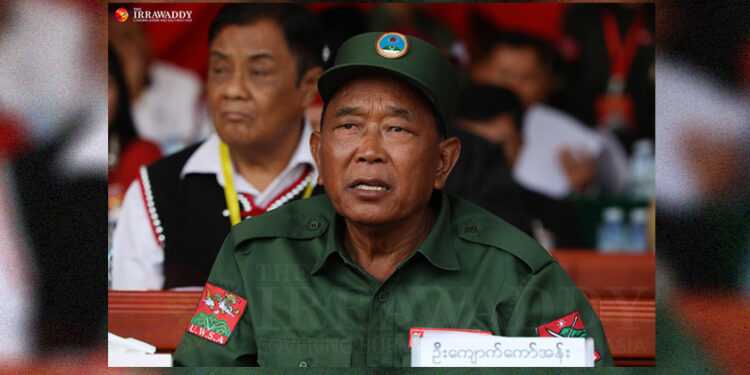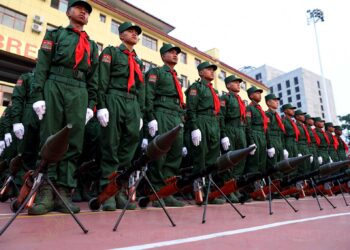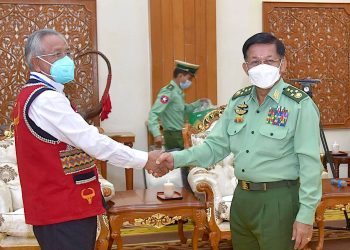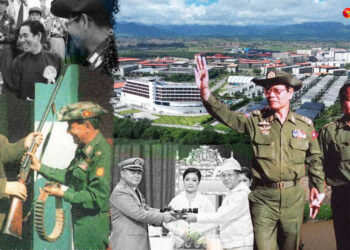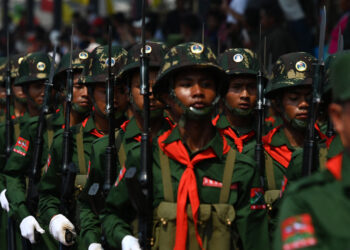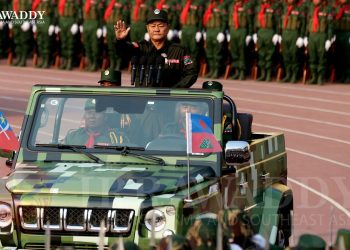PANGHSANG, Wa Self-Administered Zone — The vice chairman of the United Wa State Army (UWSA) criticized the government of the National League for Democracy for pushing the ethnic armed group to sign the Nationwide Ceasefire Agreement (NCA).
At a press conference in Panghsang on Wednesday, Zhao Guo An blamed the current administration for not implementing the deal the UWSA, Myanmar’s largest rebel group, struck with the administration that preceded it under U Thein Sein.
“Contradiction is not our problem. It is the problem of the government. There is a contradiction between U Thein Sein’s government and [State Counselor] Daw Aung San Suu Kyi’s government. The Wa group has nothing to do with the NCA regarding the implementation of the peace process,” he said.
He claimed that the UWSA agreed with U Thein Sein’s government to enter into ceasefire deals at the state and union levels but not to sign the NCA, which Daw Aung San Suu Kyi’s government is urging it to do.
The UWSA struck a truce with the military regime running Myanmar in 1989 and signed two ceasefire agreements with U Thein Sein’s government in 2011, one in Panghsang and later another in Lashio.
“We have signed agreements at two levels. Why doesn’t the government continue with them? We are being asked to sign the NCA, which we have nothing to do with. We reached many agreements with the previous government. We signed state and union level agreements,” Zhao Guo An said.
The vice chairman said he was doubtful the truces the UWSA has signed with the government will remain in effect after the next general election in 2020.
“The NCA was discussed [by the government] with other ethnic armed groups, but the Wa group did not participate,” he said.
The UWSA held its own peace talks with the government in the past. But in 2017 it allied with the Kachin Independence Army, National Democratic Alliance Army, Shan State Progress Party, Myanmar National Democratic Alliance Army, Ta’ang National Liberation Army and Arakan Army to establish the Federal Political Negotiation and Consultative Committee (FPNCC). Since then it has demanded to hold talks with the government as a bloc.
The FPNCC refuses to sign the government’s NCA and has drafted an alternative.
“I don’t know what he meant, but I have not heard such remarks from signatories or non-signatories to the NCA,” U Hla Maung Shwe, an adviser to the government’s Peace Commission and secretary for the Union Peace Dialogue Joint Committee, told The Irrawaddy.
UWSA Commander-in-Chief Bao Youxiang demanded autonomy for his region at a celebration marking the group’s 30th anniversary on Wednesday, vowing that ethnic Wa “will fight for their lives” to make it happen.
Daw Aung San Suu Kyi and military chief Senior General Min Aung Hlaing were invited to the event but did not attend.
Analysts speculated that they did not attend because the invitation letter referred to the “Wa State people’s government.” The Union government considers the Wa Self-Administered Zone a part of Shan State.
Daw Aung San Suu Kyi did send the Wa a message to mark the event in which she urged the group to sign the NCA, adding that the agreement was a step toward the creation of a democratic federal union that would grant ethnic minorities equal rights and self-determination.
“We have offered to hold talks with Wa Special Region 2,” said government spokesperson U Zaw Htay.
Article 56 (f) of the Constitution grants the Wa a self-administered zone covering six townships split between two districts. Although such zones are supposed to be under the control of the central government, the Wa effectively exercise total control over the area with their own government and administration.
Translated from Burmese by Thet Ko Ko.


